Winnipeg lab that confirmed Canada's 1st COVID-19 case now working on vaccines, tracing virus in wastewater
National Microbiology Lab has been supporting COVID-19 testing and research since January 2020
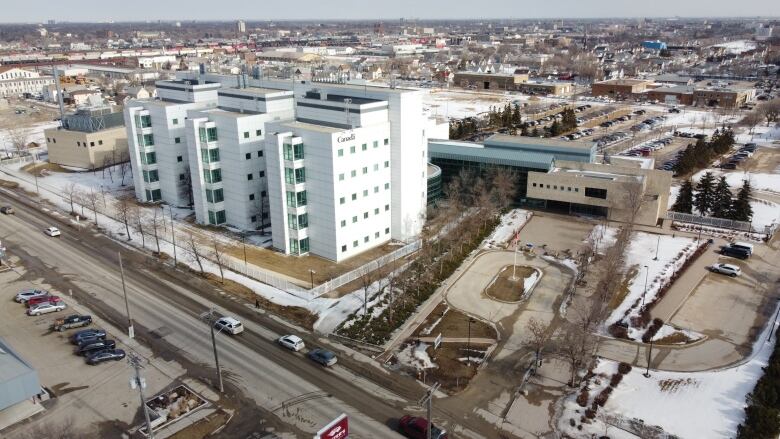
On Jan. 23, 2020, doctors at Toronto's Sunnybrook Health Sciences Centre admitted a 56-year-old man with what appeared to be mild pneumonia. Two days later, he was "Patient Zero" the first COVID-19 case in Canada.
Four days later, it was senior research scientist Nathalie Bastien's team at the National Microbiology Lab (NML) in Winnipeg that confirmed the case.
"When you want to become a scientist, when you're a young kid, this is what you dream of, to be part of helping people and saving lives in a way by stopping the spread of the virus," Bastien said in a recent interview from her lab. "It's rewarding."

Bastien's work is one example of 150 different COVID-19 projects at the national lab, which is the only Level 4 lab in Canada, capable of handling the world's deadliest pathogens.
Many of those projects are done incollaboration with academia, industry and public health partners, and more than 50 of them are related to pre-clinical research, including clinical trials in animals, testing of antibody-based therapeuticsand vaccine collaborations.
It's all part of nearly $2 billion in funding the lab has received in the last year as part of Ottawa's COVID-19 pandemic response, although the lab would not give a breakdown of how that money is spent.
"Obviously, collaborating in an environment that is fast-moving, like a pandemic response, has its challenges but the willingness to work together to achieve that common goal, which is, ultimately, to protect Canadians, has been really rewarding to see,"acting scientific general Dr. Guillaume Poliquin said in a recent interview with CBC News.
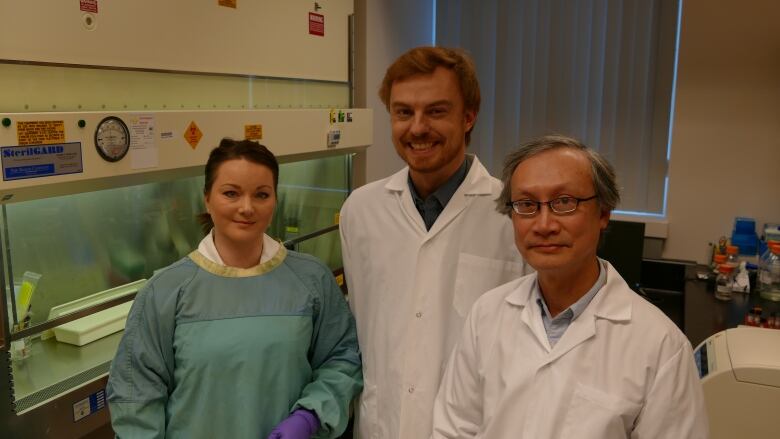
For Bastien, an expert on respiratory viruses such as the flu, SARS and H1N1, Canada's first presumed positive case of this pandemic was an opportunity to see ifyears of workwould pay off.
After theSARS epidemic, her team had developed a universal molecular PCR lab test that they hoped would be able to detect any coronavirus.
However, they weren't certainit would work onSARS-CoV-2 until thatfirst sample arrived at their Winnipeg lab.
It did work.And since then, the lab has madethat first-generation test even more sensitive. Those effortshave led to the standardized PCR testnow used in labs across Canada.
During the early days of the pandemic, all samples were sent to the NML from provincial and territorial public health labs to confirm thepresumptive results.
The NML still helps provinces and territories if their labs are overwhelmed and also supports thePCR molecular laboratory tests being done at the border to confirm or rule out active COVID-19 infections.
As well, it's constantly doing surveillance for variants of concern.
"We're still working like crazy," Bastien said.
Made-in-Canada supply chain
Scientists at the lab also stepped in to solve one of the early stumbling blocks of the pandemic, a global shortage in lab supplies and equipment needed to test swabs from possible COVID-19 patients.
This was especially true for reagents, the chemicals needed to extract the genetic material from samples.
As backlogs for testing grew, the need for a "Made in Canada" solutionbecame apparent.
"Half jokingly, we thought: 'Well, if we can't buy it, can we make it?'" Poliquin said.
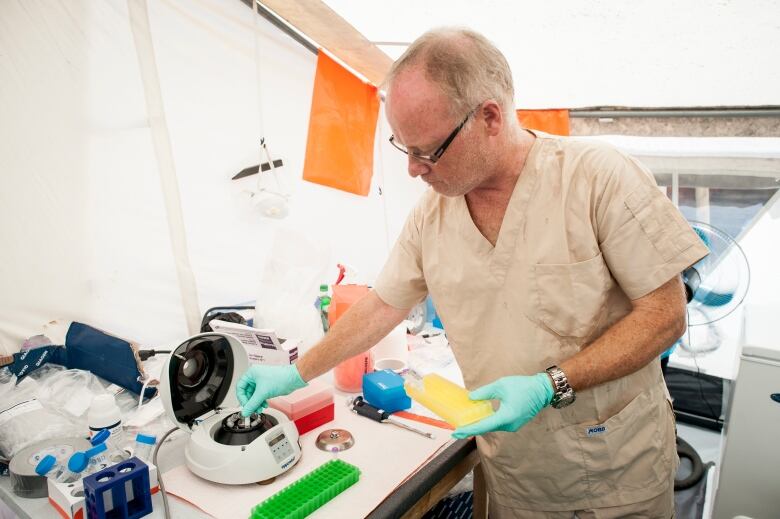
So NML managers called up biologist Allen Grolla, known as a problem-solving MacGyver.
Grolla was enjoying his first month of retirement but agreed to return to work.
His task was to find the right chemical cocktail to create a reagent that public health labs across the country could use to diagnose COVID-19. By April 2020, the reagent was being manufactured at New Brunswick-based LuminUltra Technologies Ltd. and shipped to public health labs across Canada.
"When we started down the pandemic road, there was a capacity to do a few thousand tests [a day]. In Canada, the latest capacity figures are over 200,000 tests per day," Poliquin said. "Sometimes, the crisis averted is not as glamorous as the crisis solved. But at the end of the day, that's the one that's most important."
Developing vaccines
NML scientists were the ones who developed the world's first approved Ebola vaccine, which helped save lives in Africa. So when the coronavirus pandemic emerged last year, NML scientists started developing in-house SARS-CoV-2 vaccine candidates.

There are currently fourapproved vaccinesin Canada,Pfizer-BioNTech, Moderna,AstraZeneca-Oxford and Johnson & Johnson, but NML is focused on developing ones that could beeffective against some of thevariants of concern.There is onepromising candidate that has started pre-clinical trials in animal model testing, Poliquin said.
The lab is also conducting animal tests of vaccine candidates being developed at Canadian university and industry labsto see if they're ready for human trials.
Early warning system
Another project the lab is working onis a study with the Canadian Water Network that monitors the presence of SARS-CoV-2 in wastewater. The NML is providing technical guidance to labs across the country and helping them make reliable comparisons of data across communities.
- Researchers testwastewater at long-term care homes to detect COVID-19
- Researchers explore whether human poop can help track COVID-19
Poliquin said that work made a difference in the Northwest Territories last December, when the lab alerted public health officials to community spread.
"They were seeing an increase in the amount of SARS-CoV-2 RNA in their wastewater in the community, where they knew of a single case that was isolated," Poliquin said.
"That really didn't jibe with what we were observing. The Northwest Territories, in response, did some proactive testing and identified another five individuals that were then isolated. And from there, the signal intensity decreased. So I think that's compelling evidence that using wastewater as an early warning system can, in fact, help avert larger outbreaks."

Quickinvestment is key
Dr. David Butler-Jones has been watching to see how his former colleagues are managing the COVID-19 pandemic.
He was Canada's first chief public health officer between 2004 and 2014 and co-ordinated the response during the 2009 H1N1 outbreak, which resulted in 428 confirmed deaths in Canada. An estimated 40 per cent of Canadians were immunized in a national vaccination campaign that began in October 2009.
Butler-Jones also led the Public Health Agency of Canadafrom its creation and directed PHAC's efforts to build up and co-ordinate provincial public health systems.
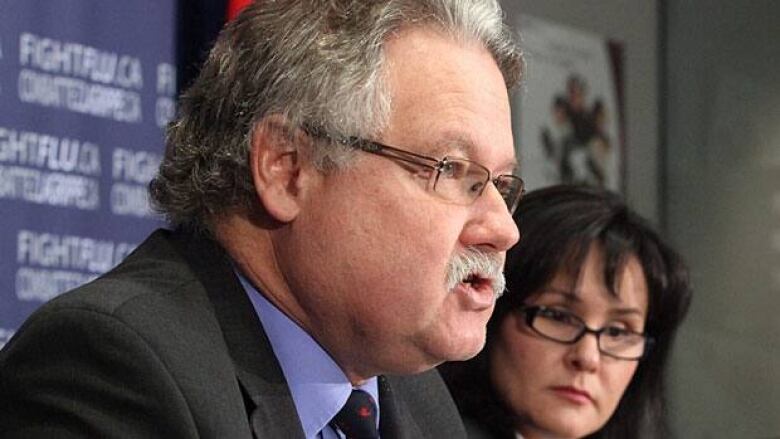
While he says he'sseena "diminishment in funding" in PHAC and NML's budgetssince 2012,Butler-Jones is pleased one of the big recommendations after SARS has been followed funnelling money quickly into research where and when it's needed.
Often, it can take more than a year between concept and development to writing proposals andreceivingfunding.
"When you're in the midst of a pandemic or a crisis, you need that money now and you need to do the research," Butler-Jones said.
Not the time to celebrate
Back in Toronto, public health officials have set up a field hospital in the parking lot of Sunnybrook Hospital's Bayview campus with 100 beds to take the stress off the intensive-care wards as they prepare for a possible third wave of the pandemic.
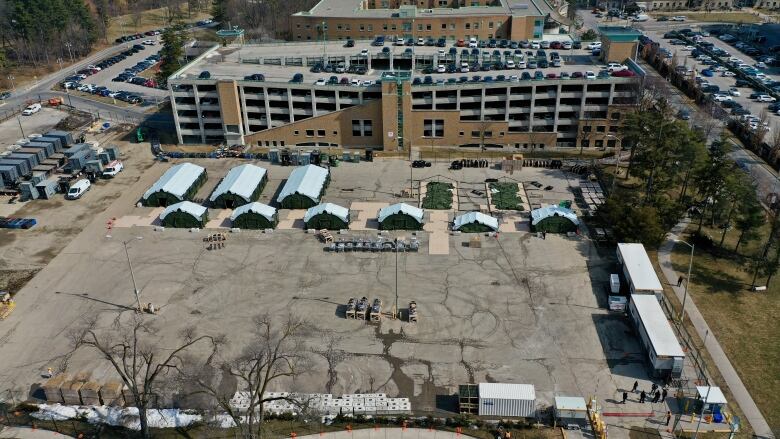
Poliquin knows his own teams have been working full-out for more than a year. He hopes they eventually get a break and the thanks they deserve.
"We've all been so busy,"he said."It's been less of a time to sit back and reflect on our successes and more of a time to put our heads down and get the work done.
"I think there will be a time and a need to celebrate everything that was achieved. But the work isn't done yet."













_(720p).jpg)


 OFFICIAL HD MUSIC VIDEO.jpg)
.jpg)



























































































